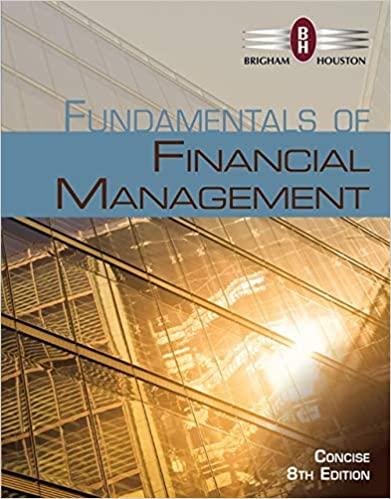INTEREST RATE DETERMINATION AND YIELD CURVES a. What effect would each of the following events likely have
Question:
INTEREST RATE DETERMINATION AND YIELD CURVES
a. What effect would each of the following events likely have on the level of nominal interest rates? 1. Households dramatically increase their savings rate. 2. Corporations increase their demand for funds following an increase in investment opportunities. 3. The government runs a larger-than-expected budget deficit. 4. There is an increase in expected inflation.
b. Suppose you are considering two possible investment opportunities: a 12-year Treasury bond and a 7-year, A-rated corporate bond. The current real risk-free rate is 4%; and inflation is expected to be 2% for the next 2 years, 3% for the following 4 years, and 4% thereafter. The maturity risk premium is estimated by this formula:
MRP 0 02 t 1 %. The liquidity premium (LP) for the corporate bond is estimated to be 0 3%. You may determine the default risk premium (DRP), given the company’s bond rating, from the table below. Remember to subtract the bond’s LP from the corporate spread given in the table to arrive at the bond’s DRP. What yield would you predict for each of these two investments?
Rate Corporate Bond Yield Spread = DRP + LP U.S. Treasury 0.83% ___ AAA corporate 0.93 0.10%
AA corporate 1.29 0.46 A corporate 1.67 0.84
c. Given the following Treasury bond yield information, construct a graph of the yield curve.
Maturity Yield 1 year 5.37%
2 years 5.47 3 years 5.65 4 years 5.71 5 years 5.64 10 years 5.75 20 years 6.33 30 years 5.94
d. Based on the information about the corporate bond provided in Part
b, calculate yields and then construct a new yield curve graph that shows both the Treasury and the corporate bonds.
e. Which part of the yield curve (the left side or right side) is likely to be most volatile over time?
f. Using the Treasury yield information in Part
c, calculate the following rates using geometric averages: 1. The 1-year rate 1 year from now 2. The 5-year rate 5 years from now 3. The 10-year rate 10 years from now 4. The 10-year rate 20 years from now AppendixLO1
Step by Step Answer:

Fundamentals Of Financial Management Concise Edition
ISBN: 9781285065137
8th Edition
Authors: Eugene F. Brigham, Joel F. Houston




